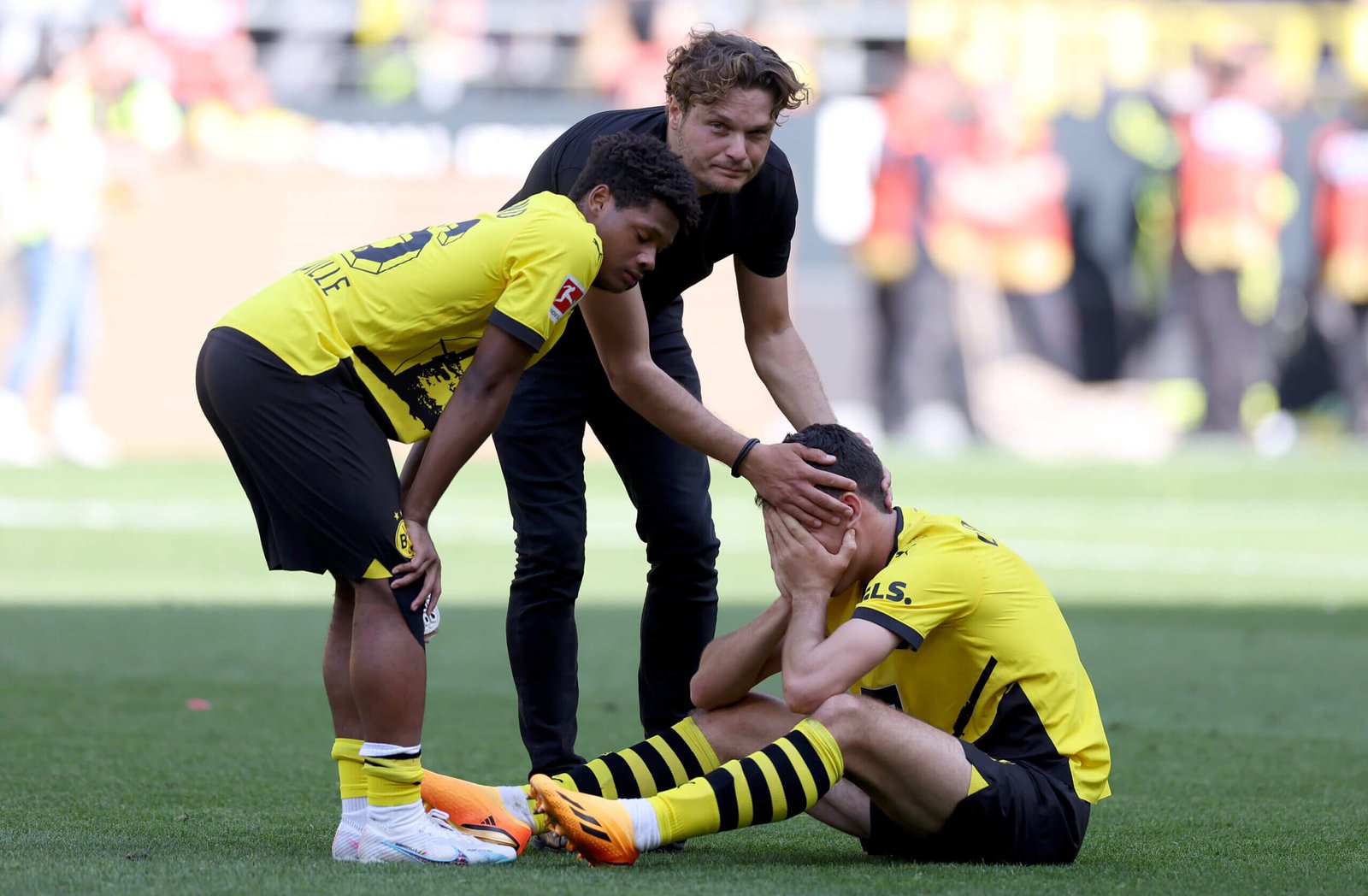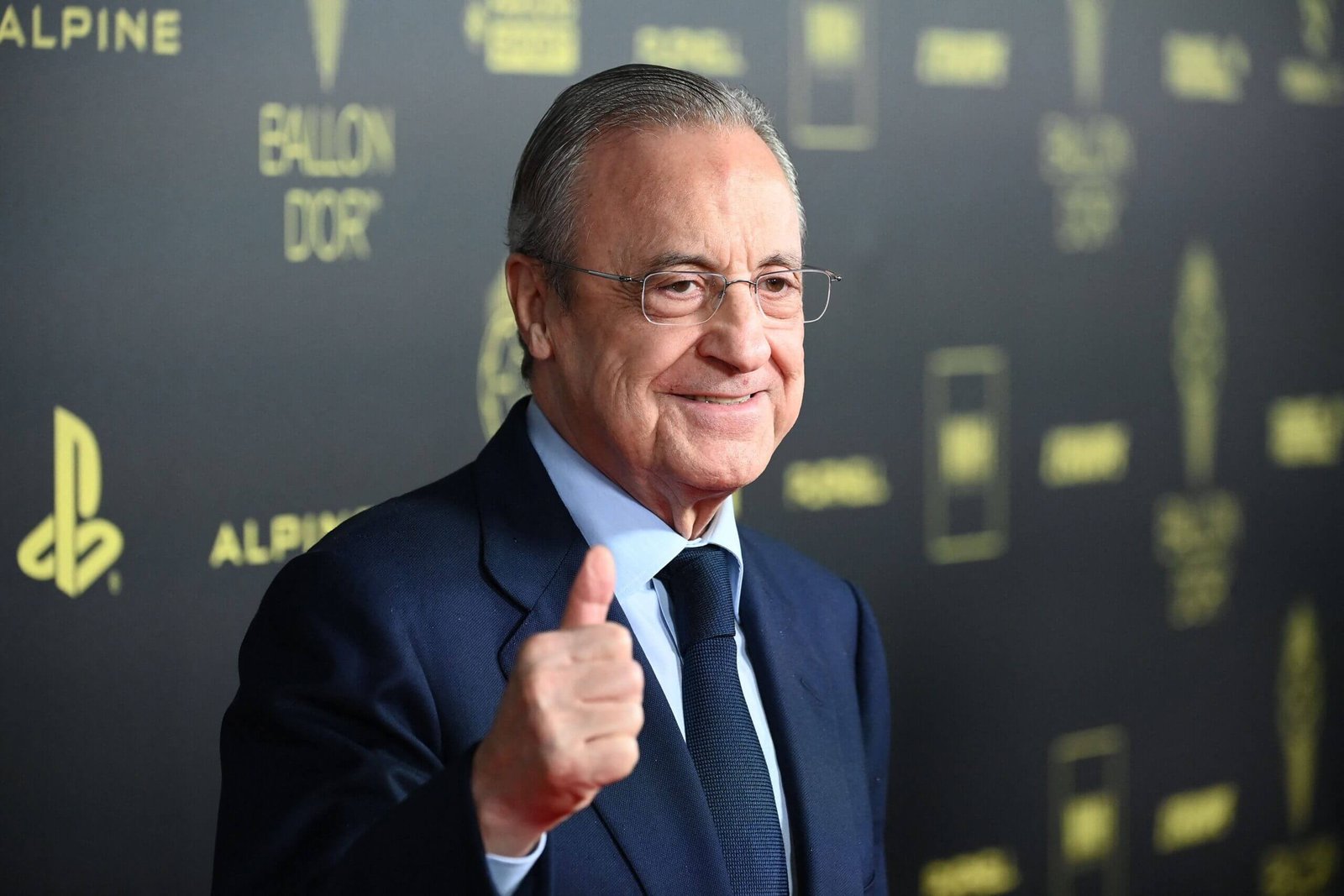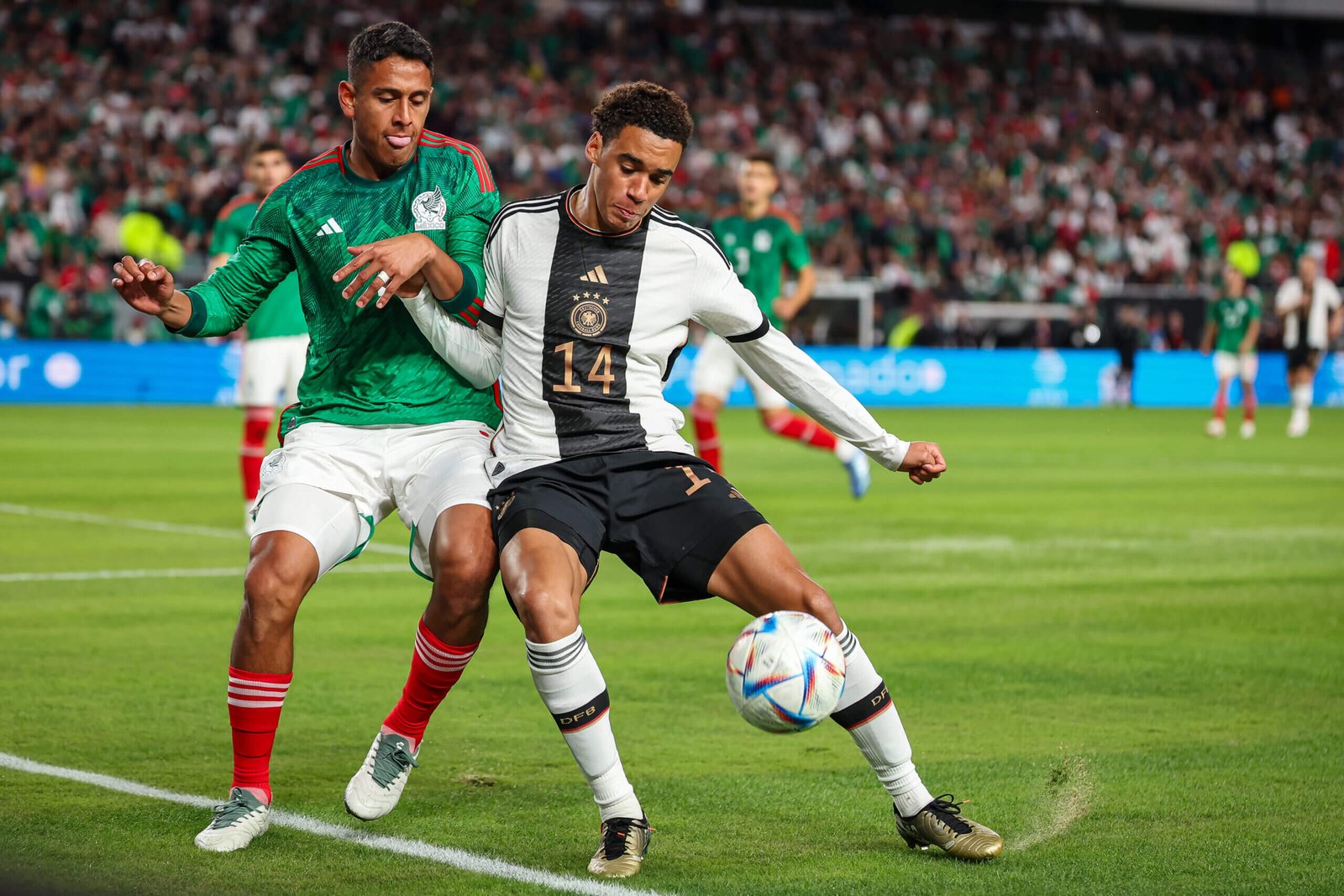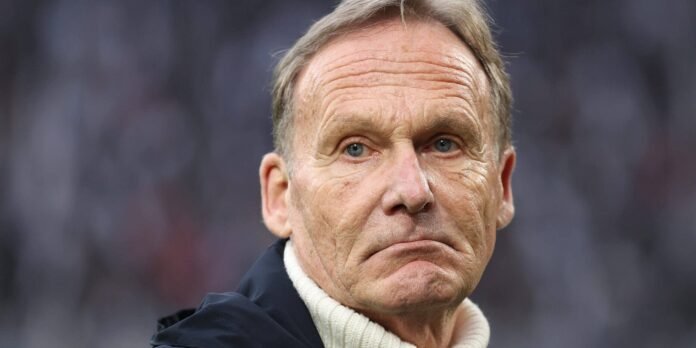Hans-Joachim Watzke is the most powerful man in German football.
As chief executive of Borussia Dortmund, vice-chairman of the German Football Association, chair of the Bundesliga’s supervisory board and a member of UEFA’s executive committee, the 64-year-old has been intimately involved with the game’s most contentious topics, from the new Champions League format, to a Super League — Dortmund refused to be party to the initial breakaway attempt in April 2021 — and the Bundesliga controversially selling part of its TV rights income to an outside investor. There is this summer’s European Championship on home soil to take care of, too.
He is a couple of minutes late for this interview with The Athletic at the team’s winter break hotel in Marbella, Spain, because a meeting with national-team sporting director Rudi Voller ran a little over.
Despite juggling so many roles and his beloved Dortmund languishing in fifth place in the league, Watzke appears pretty relaxed – yet, two days after we spoke, he announced that he will step down from the Dortmund CEO role in the autumn of 2025.
This is the transcript of our conversation.
Honigstein: How proud were you that Borussia Dortmund won their Champions League group this season, ahead of state-owned clubs Paris Saint-Germain and Newcastle United, and AC Milan, who are run by an American hedge fund?
Watzke: I don’t know about pride, but I was happy. Unfortunately, we can’t seem to be successful in Europe and in the Bundesliga in the same campaign. When we won the two championships under Jurgen Klopp (in 2010-11 and 2011-12), we got knocked out in the group stages of the Europa and Champions League. The next season, we made it to the (Champions League) final at Wembley, but were 25 points behind Bayern in the (domestic) table. This year, we’ve done well in Europe but are not completely on track in the league. That takes away a bit of the joy.
Jurgen Klopp celebrates winning the Bundesliga with Dortmund in 2011 (Patrik Stollarz/AFP via Getty Images)
Honigstein: Dortmund finishing first did show, however, that the peculiar German way of doing things — with clubs controlled by their members, not investors — can enable their clubs to compete. You must have been pleased by that.
Watzke: A few years ago, German clubs simply didn’t do well enough in Europe. Fortunately, we’ve become better.
We don’t have the financial muscle of some clubs, but the German model has advantages. You are more flexible in your decision-making and more united, you can think more strategically and long-term. I see from my dealings with investor-led clubs that they are completely different; you get the sense that their management constantly have to double-check with the owners before they can take decisions. They’re slower.
We should not kid ourselves. There’s obviously a clear correlation between financial input and sporting results. But it was nice that we had a chance to knock out PSG (in the Champions League), not the other way around. That was unprecedented. The German way isn’t as old-fashioned as some like to think.
Honigstein: Will the Bundesliga selling eight per cent of their TV rights for about €1billion (£860m, $1.1bn) to an investor for 20 years — a deal that only received the required minimum of 24 votes among the 36 professional clubs and has been opposed by many fan groups — have any impact on the financial gap?
Watzke: The concrete figures, and conditions, are still to be negotiated. But I’m certain that we can make up ground in terms of the international marketing of the league with a deal like that. Can we close the gap between us and a club like Man City or PSG? No chance at all. That’s not the intention, anyway.
Honigstein: So how does it help, exactly?
Watzke: Building streaming offerings and investing in international marketing will help make the Bundesliga more popular and accessible abroad. It helps us to compete financially with the Italians and the Spanish, who have the same problems as us.
And it can help us to distribute the story of the unique German football. There’s one exceptional league: the Premier League. It exists on a whole different planet in terms of revenue streams, and has a very different historical background as well as the advantage of the English language. It’s a fantastic competition — even if that famous atmosphere in the grounds isn’t always what it’s cracked up to be.
We can’t just say we don’t care about what’s going on around us. On the contrary, the special Bundesliga story — its clubs, its strong connection to the fans, its spectacular atmosphere — needs to be told abroad. I found it remarkable to see PSG and Newcastle fans thanking us on huge banners for the socially-minded pricing of our away tickets. People abroad do notice these things. But in the first place, they have to see and to know us.
Honigstein: Dortmund winning the title last season would have helped a lot with the league’s international appeal.
Watzke: Yes. that would have been the icing on the cake. A lot of people all over the world paid attention to that title race, it really ramped up the Bundesliga’s visibility. I experienced it myself. I was at the Europa League and the Champions League finals and many people, from (UEFA president) Aleksander Ceferin to (PSG chairman) Nasser Al-Khelaifi, came up to me and said, “I watched it. It was really exciting.”
It’s not just about who wins the league. Of course, everyone wants somebody different after 10 years (Bayern Munich have won the Bundesliga 11 straight times). But what’s been missing most is that battle for the title to the very end. We hadn’t had that for a while, Dortmund made it happen. We messed up (by not beating Mainz at home on the final day of the season). But last season created a real stir all across Europe. Bayern enjoy huge respect everywhere. If another team pushes them all the way, they can’t be that bad.

Dortmund were dejected after losing the title on the final day of last season (Lars Baron/Getty Images)
Honigstein: German fans are very protective of traditions and hugely suspicious about the influx of money. Would you like to see a more pragmatic approach?
Watzke: The Anglo-Saxon attitude towards money in football is a much more positive one. Germans are different, and things have become even more different during Covid-19, still. The prevailing mood is negative. Many people dislike the turbo-capitalism that emerged 20 years ago but we are a bit too black and white in our thinking. Anglo-Saxons see capitalism as a blessing for humanity and some people here think, more socialism would be good, because those are better people. That’s, of course, total bulls**t.
The truth is somewhere in between. I don’t like capitalism’s excesses either. As a type of economy, it’s superior to all the others, but it needs to be embedded into a framework and come with a strong set of limitations. But you get that sense that anything new is immediately viewed with suspicion in Germany, irrespective of who’s proposing it. Take the new Champions League format. I like it a lot more than the old one, which I frankly found a bit dull. It had gone a bit stale. You knew straight after the draw who would get through.
Take the group (this season) of Man City, RB Leipzig, Young Boys and Red Star Belgrade. You didn’t have to play a single game to know the ranking. It will be different next year. I don’t see many protests against it outside Germany. A lot of supporters say they don’t like it but if you speak to some of them for 10 minutes, they don’t really know what it’s about. I find the new model interesting. We can’t always reject everything only because it’s new.
Honigstein: Will the public take to the format?
Watzke: I guess after one or two years, everyone will find it’s more interesting than the old one. I’m sure.
Honigstein: Won’t we be missing those dramatic group-stage nights?
Watzke: How often are they truly dramatic?
Honigstein: Your group was!
Watzke: But that was the only one. Six groups, I think, were more or less decided two matchdays before the end. Next year, if you’re 25th in the league with two games to go, you can still make it. And I find it more intriguing to face eight different teams instead of three.
Honigstein: What’s your reaction to the European Court of Justice’s verdict on the Super League? Some said it will change football forever, while others see it as an irrelevance as long as there’s no majority among the big clubs in favour.
Watzke: The court’s opinion wasn’t adequately reflected in the press release, nor in most media reactions. It was a very nuanced, technical judgement on the legality of UEFA competition rules. Irrespective of that, I rate the probability of a Super League happening as zero. Who would be in it? The English would be stupid to enter. They already have the Premier League, the second premium competition alongside the Champions League. Why would they ruin that?
Germans don’t want it. Bayern, helpfully, took a very strong position against it. We don’t want it and we also cannot do it, because of social considerations. Who does that leave? The Italians and the Spanish playing among themselves? No.
People in football also underestimate the political backlash. It’s a strong sign when the UK government asks King Charles to publicly oppose it. I understand why the Super League want to declare the verdict a partial victory. But as long as they don’t have any clubs who want to play in it, it’s a doomed project.
Honigstein: Did your friendship with Real Madrid president Florentino Perez, the driving force behind the Super League, suffer?
Watzke: It’d be wrong to say things are as they used to be. We are still in touch, we are on friendly terms, but that really close exchange of views we used to have is somehow gone. It’s hard when you occupy fundamentally different positions on such a central topic; 13, 14 years ago, when that friendship emerged, he was already the powerful Real Madrid president he’s still today but I wasn’t an UEFA ExCo member then, nor the head of the league. Things were a lot easier between us. But I really appreciate Florentino Perez as a person and from a business perspective.

Perez’s relationship with Watzke has suffered in recent years (Franck Fife/AFP via Getty Images)
Honigstein: Dortmund have always been ardent supporters of UEFA’s financial fair play (FFP) rules. How confident are you that the latest set of regulations — including a cost-control rule limiting spend on wages, transfers and agent fees to 70 per cent of club revenues — will be adequately enforced?
Watzke: I’m convinced that the regulations have grown some teeth. For some, 70 per cent wasn’t strict enough. Others would have liked 80 or 90 per cent. There are always compromises in life.
But UEFA has set a milestone, and you get the sense talking to many clubs that they take it very seriously. At the same time, we are also seeing national leagues clamping down harder on clubs who spend beyond their means. It’s definitely a step in the right direction. I would like the Bundesliga’s licensing system to take on the essence of UEFA’s FFP as well and move beyond the existing focus on liquidity.
Honigstein: Will FFP level the playing field?
Watzke: Maybe by a few percentage points. We can’t be naive. State-owned clubs will always enjoy a huge advantage. But you can’t just give up and say there’s no point addressing it. As long as members’ clubs like Bayern or Real Madrid can still compete, the worst hasn’t come to pass.
Honigstein: Next year will see 32 sides take part in an expanded Club World Cup in the United States, to add even more games to the calendar. Is that a good idea?
Watzke: I think it will be a gigantic event, especially outside Europe, and a huge success. We, as BVB (short for Ballspielverein Borussia — part of Dortmund’s full name), would like to take part. Supporters will have their doubts, as they always have until they see it happen. I honestly think that should be the last competition we’re adding. But in South America, the heart ventricle of football, they’ve been waiting for decades to have their top teams compete in the same tournament with ours (Europe), not in the mini-competition (the seven-club version of the Club World Cup) we just saw in Saudi Arabia.
Honigstein: If it’s a big success, there will be a clamour to stage it every two years. We would then have a big tournament every summer (with the World Cup and European Championship in the other summers).
Watzke: No. A Club World Cup needs to happen just once very four years, like the World Cup. There’s no majority (among the European clubs) for anything else.
Honigstein: Aren’t the European clubs worried that the Club World Cup opens the doors to FIFA seeking control of club football?
Watzke: The Champions League will always be the biggest premium product. A Club World Cup won’t impact on UEFA’s strong position in Europe. If it’s a truly global event and it makes sense — you have to support FIFA here. I’m fascinated by the idea of coming up against (South American sides) River Plate, Fluminense or Penarol. Let’s play it first. If it’s no good, we can leave it. But my prediction is, it’ll be a big thing.
Honigstein: Any idea how much there will be in it, financially, for a team such as Dortmund?
Watzke: We don’t have any official estimates, but the sums will be considerable.
Honigstein: You’d better be in it, then.
Watzke: Only Champions League results are taken into account for qualification, which puts us in a decent position. But we do have to make up ground on the top four in the league. We haven’t performed well enough. Last season, we picked up 42 points in the second half of the season. The team can’t have forgotten how to play football. Of course, it’s difficult when you lose your best player each year, as we did with Jude (Bellingham, sold to Real Madrid) last summer. But that’s our fate. Dortmund is not a metropolis. We don’t have milk and honey flowing down the river. We don’t even have a river, unlike most big cities. You have to regroup every year, and it hasn’t worked out perfectly so far.
Honigstein: From the outside looking in, Dortmund’s chronic inconsistency is hard to understand.
Watzke: We were only inconsistent in the second half of the 16 league games so far. We had 20 points from the first eight, 2.5 per game, that was championship-winning form. Then we lost our way. We couldn’t cope with playing every three days.
Honigstein: You have kept on manager Edin Terzic but brought in two new assistants in Nuri Sahin and Sven Bender, two former Dortmund players. What was the thinking there?
Watzke: We needed to change something, we needed some new input. We sat down together and Edin made the suggestion to bring in two new assistants. They (Sahin and Bender) are both big BVB fans and BVB championship winners, different personalities but really good friends. They will do us good. It takes a lot of self-assuredness for a manager to bring in two strong people. I admire that in Edin. Strong people bring in strong people, weak people bring in weak people.
Honigstein: How does the new setup change Terzic’s role?
Watzke: The emphasis is now on him being truly a head coach. Before that, it felt to me as if he was doing everything himself on the training pitch. If you’re directly involved in the exercises, you can miss a lot. There’s a reason why military commanders used to watch battles from mountaintops rather than throw themselves into the fight. Edin is building his setup.
If we lose the next four games, people will of course say, “What a great job you did there.” But I’ve been doing this for 19 years. I was 17th in the table at Christmas with Klopp in 2014, and I experienced two real crises, at the beginning (when Dortmund nearly went insolvent) in 2005 and Covid, which saw us lose €151million. This type of (footballing) crisis, we can handle. Which is why I’m not as nervous as some who are close to the club.
Honigstein: How are your levels of nervousness in relation to the national team? A fourth successive poor tournament next summer would be a huge embarrassment, especially on home soil.
Watzke: I don’t bear the ultimate responsibility as I do with Dortmund, so watching games isn’t quite as tense for me. But of course, I want us to play a decent Euros. And I’m convinced we will do that. The only things stopping us would be having a bad team and a coach who isn’t up to the task. But we have top players and my opinion of (new manager) Julian Nagelsmann is very positive. We are not top favourites, but we can do well.
Most importantly, the team need to show the fans that they’re willing to give their all. And that we can play a bit, too.

Jamal Musiala, right, is a coveted talent in the Germany side (Scott Taetsch/Getty Images)
Honigstein: Can these players come together as a team, though? That has perhaps been the biggest problem since 2016.
Watzke: It was the same at the Euros in 2012, when people said mixing Dortmund and Bayern players doesn’t work. One year later, we played each other in the Champions League final and the following year (after that), we won the World Cup. Everyone envies us for having talents such as Jamal Musiala or Florian Wirtz. The conditions for success are there. Now Julian has to make a team out of them. He will get it right.
Honigstein: This question is perhaps the most difficult one: should Dortmund stop being content with being the second-biggest team in Germany? Is there any realistic way of you becoming number one?
Watzke: We had no real chance before (winning the league in) 2011, but did it anyway. It can happen, when we use the momentum of a positive situation. Dortmund, as a club, are able to generate extraordinary energy. We wouldn’t even be discussing this question if we hadn’t been stupid enough to not win our last game against Mainz (last season). So it is possible. But not every year. Bayern need to be below their best and we need to perform exceptionally well. Otherwise, they will win every year because they are €150million to €200m per year ahead of us in terms of wages. That translates into about 10 world-class players.
If you’re asking me whether we can close that financial gap, I’d say no. Munich is in (wealthy) Bavaria. Dortmund is in (less wealthy) North Rhine-Westphalia, and is not even the capital of the region (Dusseldorf is). We could close the gap if we brought in an Arab-state fund, but we are accountable to our members and they don’t want it. We accept that.
Honigstein: Will there ever be a change of heart among BVB supporters, a willingness to take the money in order to challenge Bayern on a more even keel?
Watzke: We have strategic investors queuing up to get involved but the members don’t want that either. They can’t decide what left-back we’re buying, but when it comes to the fundamental, strategic issues we have to be on the same page. I respect their position and wouldn’t want it any other way. I wouldn’t try to convince them that we should sell 45 per cent of the club to a state fund. I’m not at all opposed to everything to do with money in football. But in that specific respect, I, too, am a traditionalist.
(Top photo: Lars Baron/Getty Images)
Read the full article here


